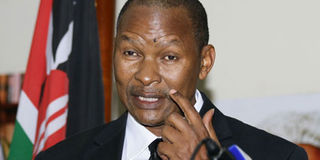Graft team set to audit major scandals

PHOTO | BILLY MUTAI Mr Mumo Matemu shortly after he took his oath at the Supreme Court to chair the Ethics and Anti-Corruption Commission on August 5, 2013.
What you need to know:
- Controversial purchase of voting kits and the Nairobi cemetery scam among scandals being audited under new EACC leadership
The election kits scandal and the Sh4.2 billion free education scam are among graft cases that will be audited as the new chairman of the anti-corruption commission settles in office.
The agency under Mr Mumo Matemu also intends to revive the Sh1.2 billion National Hospital Insurance Fund fraud and the Nairobi cemetery scandal involving Sh283 million.
Mr Matemu, who was sworn into office as chairman of the Ethics and Anti-Corruption Commission by Chief Justice Willy Mutunga last week, has ordered an audit on investigations into the Sh1.2 billion Tokyo embassy scandal.
He will be working with two other commissioners, Prof Ruth Onsongo and Ms Irene Keino who joined the agency late last year.
The three are today set to meet EACC chief executive officer Halakhe Waqo to set the agenda for the commission and revive the campaign against corruption which stalled after Mr Matemu’s appointment was challenged in court.
In an interview, Mr Matemu said the audits were expected to take 10 days.
“The report will provide a firm basis for us to speed up our investigations.”
Although Mr Matemu did not list the cases to be audited, staff at the agency indicated that they would detail the status of the Goldenberg and Anglo Leasing type of contracts in which the country is suspected to have lost more than Sh100 billion.
Mr Matemu said the audit was expected to show the number of witnesses interviewed in each case, documents recovered, computerised documents filed and forensic materials obtained.
The audit will also examine the capacity of staff handling each of the cases.
Mr Matemu said he hoped to ensure balance between prosecutions of the corruption cases and recovery of assets.
“We don’t want to condone crime at all but we also do not want our county to end up losing what it can easily recover.”
Such amnesties have been successful in the recovery of outstanding rates and loans in councils, municipalities and the Higher Education Loans Board.
Mr Matemu said he would work closely with the office of the director of public prosecutions, Mr Keriako Tobiko, to ensure that there was consensus on cases that require action to ensure speedy prosecutions.
“I want to ensure that our fight against corruption is seen to be fair, independent and based on available evidence,” he said. “We will remain above board and will resist anyone to use us to fight individual wars.”
Mr Matemu said the commission would give priority to public education to encourage Kenyans to start reporting corruption to the agency.
During today’s meeting, commissioners are expected to discuss ways of addressing their staff crisis.
Over the past two years, more than 60 workers have left the agency, many to join the Judiciary and other State departments.
Mr Matemu said more workers will be hired to replace those who left and to fill new positions that now available at the commission’s newly established regional offices.
The commission expects more corruption cases to be reported following the discovery of minerals in some parts of the country that promised to create avenues of mismanagement.
He called for patience if the campaign is to succeed.
“I know Kenyans want instant blood spilt over corruption but I am asking them to be patient as we put in place systems that would ensure we win the battle fair and square.”
He promised to raise the profile of the commission, which recorded its worst performance in five years last year.
The Economic Survey 2013 revealed that the commission handled the least number of cases last year.
According to the report released in May, the number of cases EACC handled declined by 51 per cent, from 7,326 in 2011 to 3,592 last year.
Additionally, the number of criminal cases the agency handled dropped from 2,916 in 2011 to 1,486 last year.
Ms Keino, the commission’s vice chairperson, attributed the poor performance to the leadership and staff problems the agency faced during the period.
Operations stalled
“Most the commission’s operations stalled and this is reflected even in our inability to use the budget allocated to us,” she said.
Whereas the agency had in 2011 advised 2,050 people on the right agencies to report their allegations to, the report shows it could only offer the same service to 1,021 people last year. The number of cases the commission forwarded to the Director of Public Prosecutions Keriako Tobiko reduced by 49.3 per cent, from 138 to only 70 last year.
Mr Tobiko accepted more than half of the cases referred to him for prosecution during the period.
The number of cases handled by the commission in 2012 was the least for the last five years. In 2008, the agency, then known as the Kenya Anti-corruption Commission, handled 3,868 cases, the lowest previous figure recorded in the Economic Survey.



